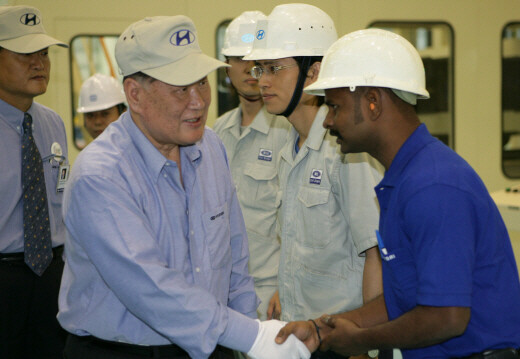hankyoreh
Links to other country sites 다른 나라 사이트 링크
Labor disputes swell at overseas Hyundai Kia Automotive Group plants

Management-labor issues at Hyundai Kia Automotive Group’s overseas plants, with strikes at their plants in China and India suspending production, have become a major issue within the company. Concerns also appear to be mounting for other South Korean companies have flooded into China and India in search of cheap labor.
At Hyundai’s India plant in the city of Chennai in the southern state of Tamil Nadu, about 200 night shift workers launched a surprise sit-in demonstration at the plant’s production line No. 1 at 11:45 Monday (local time), bringing production to a standstill. In order to prevent the demonstration from spreading, the company closed its second factory and engine factory. The suspension of work also continued into Tuesday.
The demonstrators have reportedly demanded the reinstatement of fired workers. Hyundai’s India plant also experienced turmoil last year over the issue of recognizing its labor union. Hyundai has requested that the state government deploy the police, but there is also concern that depending on the situation, the occupation could become prolonged. The factory produced two models, the i10 and i20, at 2,100 units a day. At the end of last month Hyundai’s Beijing factory also experienced a work shortage when a subcontractor went on strike.
The problem is that this situation could grow more frequent in the future. In particular, the consensus is spreading rapidly in China that worker wages are too low, and the public sentiment has continued that the Chinese government is also virtually aiding and abetting the demands for wage increases in order to resolve the gap between rich and poor, which has grown dramatically.
“China and India have both entered the period in which labor costs will increase simultaneously with more vocal demands for better work conditions,” said Shim Sang-hyung of POSCO Research Institute. “Firms heading overseas can no longer settle for only cheap costs of labor, but rather accept to some extent demands from local workers and initiate reforms.”
Please direct questions or comments to [englishhani@hani.co.kr]
Editorial・opinion
![[Editorial] Penalties for airing allegations against Korea’s first lady endanger free press [Editorial] Penalties for airing allegations against Korea’s first lady endanger free press](https://flexible.img.hani.co.kr/flexible/normal/500/300/imgdb/original/2024/0502/1817146398095106.jpg) [Editorial] Penalties for airing allegations against Korea’s first lady endanger free press
[Editorial] Penalties for airing allegations against Korea’s first lady endanger free press![[Editorial] Yoon must halt procurement of SM-3 interceptor missiles [Editorial] Yoon must halt procurement of SM-3 interceptor missiles](https://flexible.img.hani.co.kr/flexible/normal/500/300/imgdb/child/2024/0501/17145495551605_1717145495195344.jpg) [Editorial] Yoon must halt procurement of SM-3 interceptor missiles
[Editorial] Yoon must halt procurement of SM-3 interceptor missiles- [Guest essay] Maybe Korea’s rapid population decline is an opportunity, not a crisis
- [Column] Can Yoon steer diplomacy with Russia, China back on track?
- [Column] Season 2 of special prosecutor probe may be coming to Korea soon
- [Column] Park Geun-hye déjà vu in Yoon Suk-yeol
- [Editorial] New weight of N. Korea’s nuclear threats makes dialogue all the more urgent
- [Guest essay] The real reason Korea’s new right wants to dub Rhee a founding father
- [Column] ‘Choson’: Is it time we start referring to N. Korea in its own terms?
- [Editorial] Japan’s rewriting of history with Korea has gone too far
Most viewed articles
- 1[Editorial] Penalties for airing allegations against Korea’s first lady endanger free press
- 260% of young Koreans see no need to have kids after marriage
- 3Months and months of overdue wages are pushing migrant workers in Korea into debt
- 4Bills for Itaewon crush inquiry, special counsel probe into Marine’s death pass National Assembly
- 5[Reporter’s notebook] In Min’s world, she’s the artist — and NewJeans is her art
- 61 in 3 S. Korean security experts support nuclear armament, CSIS finds
- 7S. Korea discusses participation in defense development with AUKUS alliance
- 8[Guest essay] Maybe Korea’s rapid population decline is an opportunity, not a crisis
- 9[Editorial] Yoon must halt procurement of SM-3 interceptor missiles
- 10Cracks found in containment building of UAE nuclear power plant built by S. Korean companies